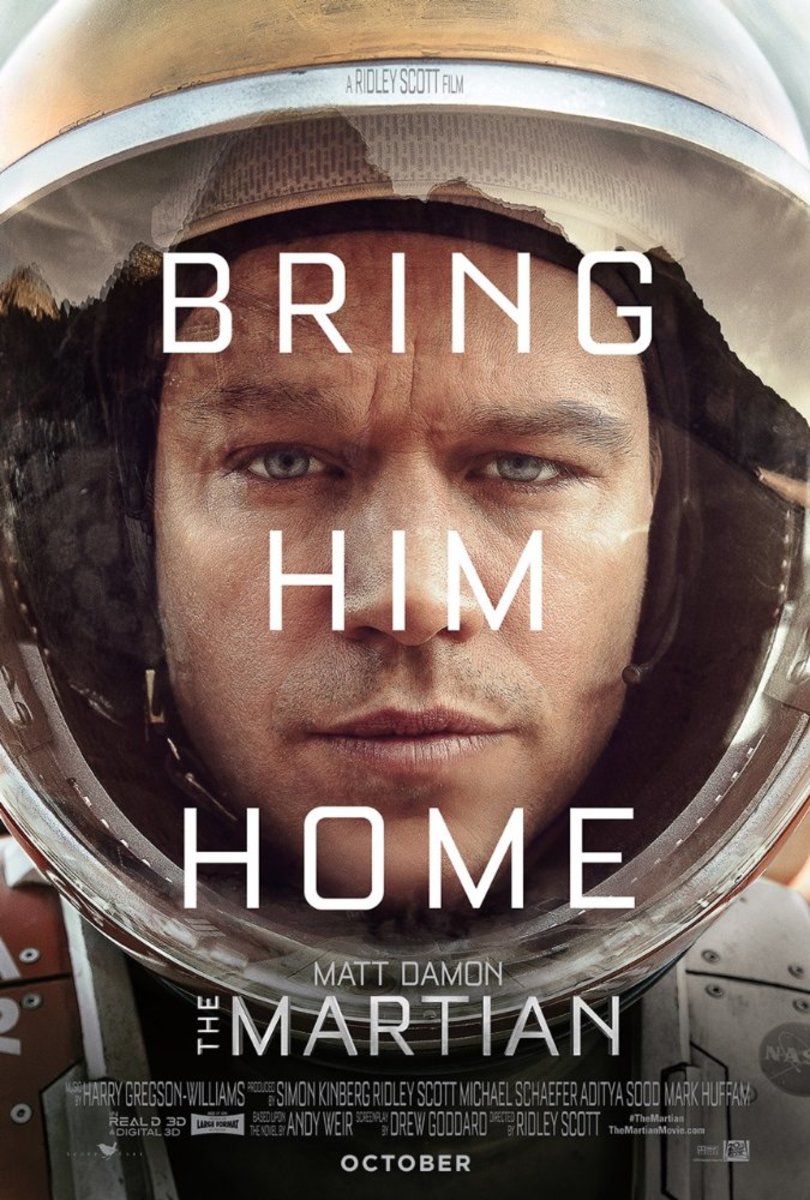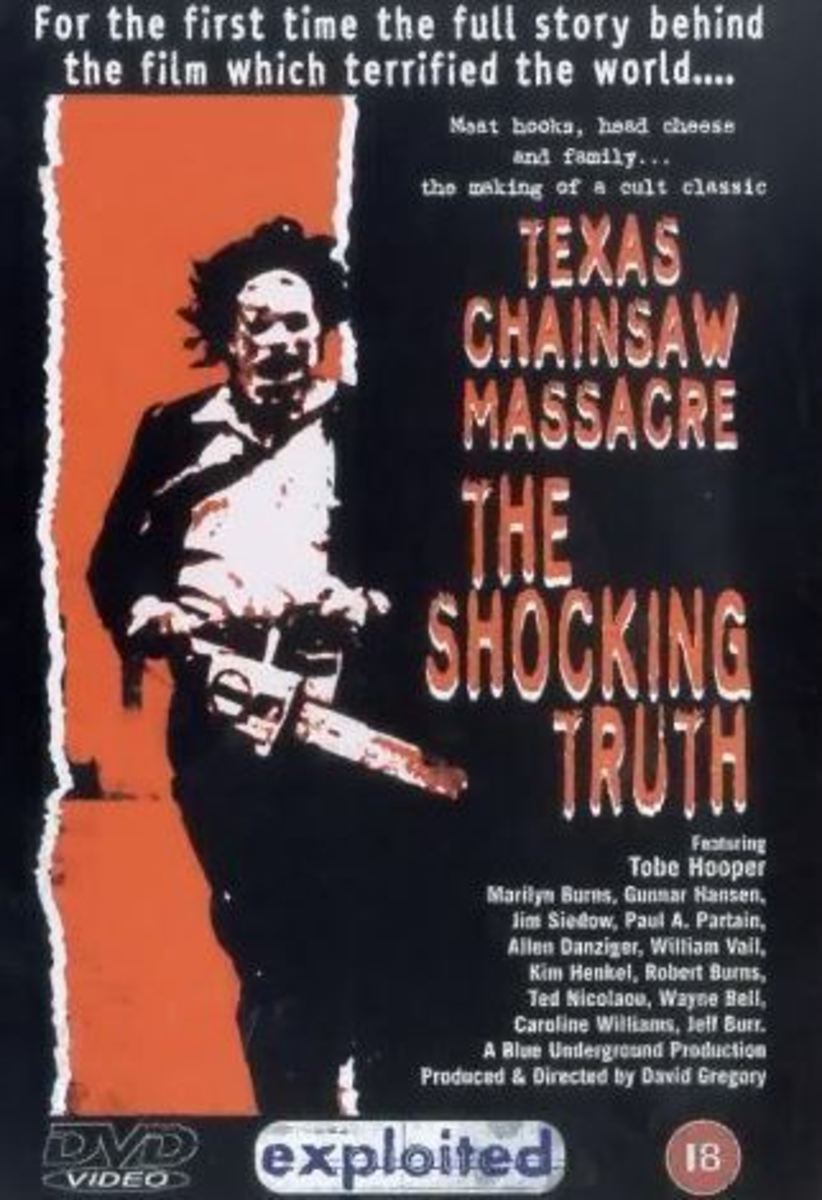Inside the Movies: Keanu Rules the “Street”
Genre: Cops & Robbers
Rating: 3 ½ bullets (out of 5)
Welcome to another entry in the cops-and-robbers film library, although I had a tough time identifying Street Kings as such. Overall, I enjoyed this vigilante-style revenge flick and found its dark and matter-of-fact delivery engaging and though-provoking, while providing lots of calculated violence to satisfy my bloodlust. From my independent filmmaker point-of-view, here are some of the technical reasons why the film did and did not work for me.
Fox Searchlight Pictures' "Street Kings"
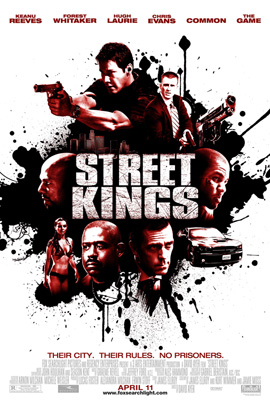
The Plot
Yahoo! Movies describes the film plot as: "Tom Ludlow (Keanu Reeves), a veteran LAPD Vice Detective, sets out on a quest to discover the killers of his former partner. Captain Wander's, Ludlow's supervisor ((Forest Whitaker), duties include keeping him within the confines of the law--and out of the clutches of Internal Affairs Captain Biggs (Hugh Laurie). Ludlow teams up with a young Robbery Homicide Detective (Chris Evans) to track Washington's killers through the diverse communities of Los Angeles."
Bad Title
Before I knew what it was about, the title Street Kings evoked visions of leather jackets, 20-something greasy punks, and knife fights in alleys-maybe even a dance contest to straighten out the hero before he falls in with the bad apples. Or maybe an extreme sport movie focusing on skateboarding or some as-yet undocumented form of street racing (if one still exists). But no, this is definitely a cop flick, and a mighty fine and gritty film it turns out to be-even if the title is wimpy.
Inconsistent Writing
The screenplay is a mix of genre conventions and powerful yet subtle character points. I'm guessing that with James Ellroy (novelist and screenwriter of L.A. Confidential, Dark Blue and The Black Dahlia) as the main screenwriter, the better writing came from his word processor while the other two credited screenwriters (Kurt Wimmer and Jamie Moss) added the more predictable elements. But this is just a guess.
The plot takes time to unfold, with a healthy dose of screen time spent setting up Ludlow as a ruthless, vigilante cop who feels no perceivable remorse for killing the bad guys without even trying to arrest them. His supervisor and the whole darn vice squad do everything they can to cover their own hired gun's tracks and keep his efficient and final form of crime prevention a secret from the media and Internal Affairs. Only when we're convinced that Ludlow is a calm and cool psycho with a badge does Ellroy move into the main story flow as Ludlow pursues his ex-partner's killers. For me, the key question that is set up and continues to arise was "Is Ludlow cold enough to kill anyone who's guilty of a crime, even a friend or another cop?" Fortunately, Ayer subscribes to Sidney Lumet's belief that "the inevitability mustn't eliminate surprise,"1 and so I was still surprised but satisfied by Ludlow's final actions.
Note: It is my policy NOT to spoil key plot points of a film. I'd rather you enjoy the surprises as much as I did.
One great example of the film's best writing comes when we discover the likely reason for Ludlow's recklessness. During a confrontation between Ludlow and a pathologist, we learn that the pathologist also handled Ludlow's wife's autopsy. Ludlow refers to the pathologist as, "the guy who washed away all the hair and fiber evidence. The guy who wouldn't do a vaginal swab. The guy who left me with nothing to go on." The pathologist is quick to reply, "It's not my job to investigate adultery." And that's it, until much later in the film when there are some less subtle and unnecessary references to his wife death.
An example of the film's most heavy-handed writing comes in a moment of vulnerability within an almost unnecessary conversation between Ludlow and his marginally necessary love-interest, Grace. She tells Ludlow, "Don't turn your back on him. Good can come from bad." Ludlow responds with "In my world... the real world... bad breeds more bad, Grace." After seeing Ludlow blow away several nasty criminals, this observation is already obvious and will become even more obvious as the various plot twists reveal themselves, so why did someone have to say it out loud?
Keanu the Kool Kop King in Fox Searchlight Pictures' "Street Kings"
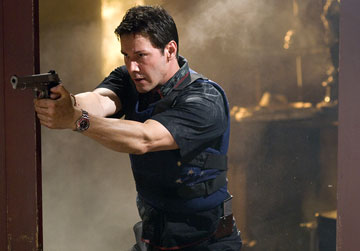
Unconventional Acting
For me, Keanu Reeves has an inconsistent career in movies, shining in films like Speed, The Matrix and A Scanner Darkly, but choking in Dracula, Matrix 2 and 3 and Constantine (to name only a few). So I entered the theatre with reservations about Keanu and hopeful confidence in David Ayer as director (writer on Training Day, Dark Blue and S.W.A.T, and first-time director for the very aptly titled Harsh Times). About halfway through Street Kings, I asked myself, do I buy Keanu as a ruthless vigilante cop? Why doesn't he scowl or grit his teeth like Bruce Willis before he callously dispatches another baddie? Has Keanu hit his emotional ceiling with this role? Can he only play impassionate and emotionally void characters? Whether the credit goes to Keanu, Ayer or both, it suddenly occurred to me that it's quite convincing for a vigilante cop to act numb and uncaring rather than bitter and expressive. I think it was a brave choice to have the protagonist so void of feeling and expression, especially when executing his brand of justice, almost as if it truly is just another day at the office, rather than a delicious chance to flex his muscles and spew testosterone and quips. So Keanu plays it more like Sean Connery in Dr. No or Clint Eastwood in A Fistful of Dollars: efficient and impassive.
Ludlow's vice squad team mates-led by the always reliable Forest Whitaker as Captain Wander and fleshed out with a host of competent characters actors including Jay Mohr and an almost unrecognizable John Corbett-provide an entertaining perspective on the tight-knit police unit that always seeks to protect their own from outside criticism while banding together to share in some camaraderie and covert corruption at the local pub.
Oddly, Chris Evans as Detective "Disco" Diskant becomes a principal character halfway through the film when he chooses to become Ludlow's sidekick in his secret investigations and vendettas. Evans is certainly skilled as an actor, but I found that the character was introduced so late in the film and after some obvious conflict between him and Ludlow that I was surprised when he took on a larger role. I even found it a little implausible that he would suddenly want to join Ludlow's cat-and-mouse game. I might have introduced the character earlier in the script or provided more clear motivation of why he would want to raise the stakes of his police work to the Dirty-Harry level.
By the way, kudos go to Hugh Laurie for getting out the House and softening his acerbic and clever wit while creating the perfect balance of intensity, mystery, humor, and heart for his supporting role as Internal Affairs Captain Biggs.
Forest Whitaker protects Keanu Reeves in "Street Kings"
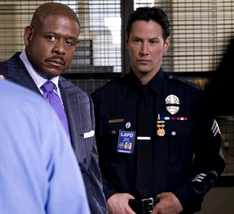
Dark and Shifty Direction and Cinematography
As I mentioned, one of the main reasons I was drawn to this film was because of David Ayer, who has made a good transition from writer to director. He knows how to write urban police stories and seems to have learned how to tell those stories with moving pictures, too. I enjoyed the darkness of the film's lighting. Although there are many scenes that take place during the day, there are still plenty of shadows in the corners of the interior sets to bring down the brightness.
Ayer does rely too much on the now-ubiquitous hand-held (or at least they appear to be hand-held) camera moves, popularized with the NYPD Blue TV show and highly prevalent in current action films (most recently done to dizzying and even vomit-inducing effect on Cloverfield and The Bourne Ultimatum). However, to be fair, Ayer and cinematographer Gabriel Beristain do more tilting and shifting than shaking. When used occasionally, it can be effective to show a close-up of Ludlow's face then quickly tilt down to the gun in his hand. But when it happens often and during fast-paced scenes, it can appear inefficient and clumsy, and even slow the pace down; a medium shot or well-framed long shot can show the face, the gun and the character's body movements all at the same time. Still, this was a choice Ayer made to create an edgy, tense mood for his film, and in many cases, it's used discreetly and effectively.
Despite the misleading title and some heavy-handed dialog and camera movements, Street Kings works for creating tension and intrigue. The story was complex enough leading me to predict one direction then diverting me into another and adding enough twists to keep me guessing for most of the film. Keanu successfully pulled me into identifying with his numb and skewed world of violent justice and David Ayer can add another respectable notch on his crime drama belt.
1 Lumet, Sidney, "Making Movies" (1995, Vintage Books, New York), page 31
- Street Kings (2008) - Movie Info - Yahoo! Movies
Street Kings (2008): find the latest news, photos and trailers, as well as local showtimes and dvd info at Yahoo! Movies




